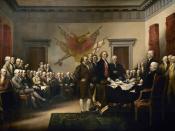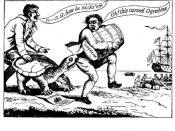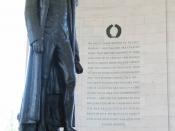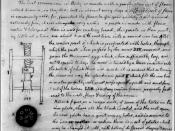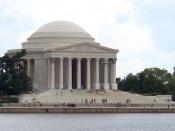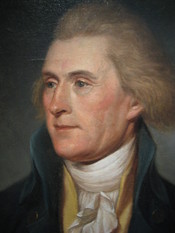Jefferson's Presidency Jefferson was first noticed during the time of Washington's presidency. He acted at the Secretary of State. His chief adversary was the Secretary of Treasury, Hamilton. Hamilton enforced "funding at par", which was the liquidation of the national debt by the federal government and "assumption", which was the liquidation of the state debt by the federal government. States with no or little debt were against the plan but those with large debt favored it. When Hamilton proposed the Bank of the United Stated, Jefferson opposed it by stated it was unconstitutional; the constitution was to be interpreted literally - strict construction. Hamilton's rebuttal was the loose construction of the constitution due to the elastic clause.
Prior to the end of Adam's presidential term, the Judiciary Act was passed. The case of Marbury vs. Madison showed that the Supreme Court had the final word (Judicial Review). Futilely, Jefferson tried to battle its power by trying to impeach Supreme Court Justice, Samuel Chase; his accusations were considered unconstitutional and thrown out.
Thomas Jefferson was the Third President. When he won the election it was called the "Revolution of 1800" because of the peaceful transfer of power on the basis of election. Spoils of office were introduced at this time. Due the heated feud between Hamilton and Jefferson, when Jefferson was inaugurated he brought in all his people and vanquished the federalist. Jefferson wasted no time to make congress repeal the excise tax which he hated, but other than that, He basically left all Hamilton work in tact. Jefferson had same idea Washington did - no wars. Therefore Jefferson, throughout his term would do all that he could to keep American out of war. The only small squirmish of war involved his mosquito fleet, which fought off pirates in the War of Tripoli. The War of Tripoli began when the pirates of the North African Barbary States had already set up business in blackmailing and merchants ships that sailed to the Mediterranean. He detested large armies because it was a sign and foreshadow to dictatorship. Eventually the war ended in the signing of treaties.
Jefferson sent two envoys, Livingston, and Monroe, to find land, but to maintain a budget of only $10 million dollars. They ended up spending $15 dollars for the Louisiana territory that they purchased from Napoleon. Jefferson had one problem with the purchase: was it constitutional? Conscience stricken, Jefferson submitted the treaties to senate where it was passed. It was called the Louisiana Purchase. He sent two explorees - Lewis and Clark - to explore the new fast north region.
When Jefferson was reelected in 1804, France and Britain were at war and American ships were being impressed. Napoleon provoked war with Britain, and London reacted by issuing a series of Orders of Councils, which closed the ports under French control. Napoleon then returned by seizing all merchant ships that enter British ports. Finally, after the Chesapeake Incident Jefferson introduced the Embargo Act of 1807 - forbade the export of all goods from the US - in order to keep us out of war. It crippled the young country economically, and antifederalist repealed it and provided the Non-Intercourse Act as a substitute. This new act led to the reopening trade with all except England and France. Later Macon's Bill No. 2 was adopted, which stated America could trade with the entire world, however, if either England or France repealed its commercial restrictions, America would once again cease trade with them. Jefferson set two precedents while in office: 1. Sending messages to congress to be read by a clerk, 2. Two term presidency.
